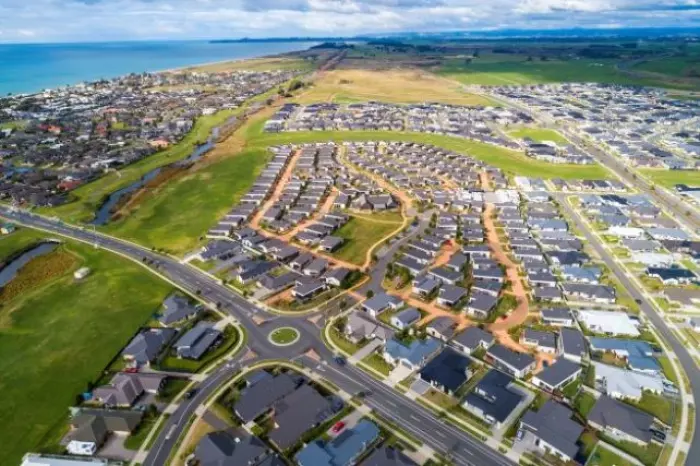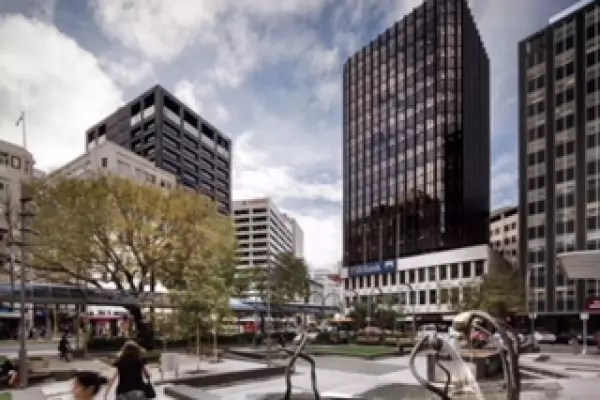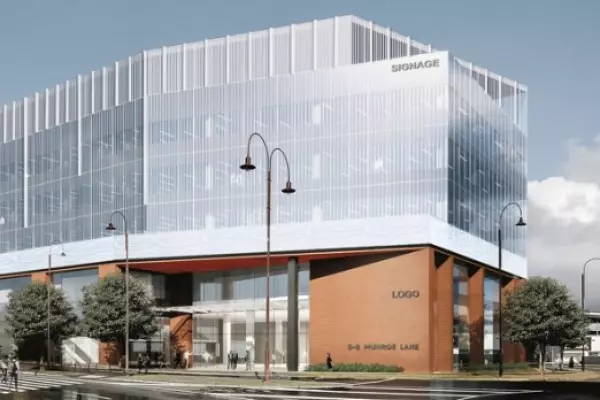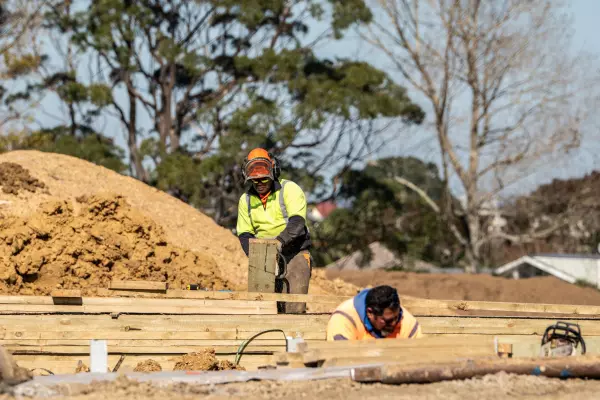New Zealand’s consenting authorities have turned what should be a straightforward, templated process into an expensive and confusing minefield of needless compliance, say builders and developers.
That’s reinforced by pricing comparisons of like-for-like build applications that show significant cost variance across a dozen of the 67 building consent authorities (BCAs), accredited by International Accreditation NZ (IANZ).
Data supplied to BusinessDesk by franchise building group Golden Homes shows that building application consent fees can range anywhere from $3,572 for a four-bedroom home in the Selwyn District to $40,174 for a 229 square metre, three-bedroom new build in Tauranga.
The Tauranga City Council, unlike most other councils, includes its development contribution fees, used to pay for wastewater and roading, with its building consent invoices.
Those fees, which jumped by $8,849 from this February, are now at $24,832 and are applied to all new builds.
Other BCAs, such as Hamilton City Council, tend to invoice their contribution fees out separately. Billing varies with infrastructure charges sometimes levied during construction, or during Code of Compliance issuing.
But even stripping out those costs, the consenting invoice for a three-bedroom, 161-sqm Tauranga home came in at $11,133, still ahead of the average of $9,253 across a cross-section of 34 homes around the country.
A 139-sqm home in Queenstown was billed $5,066 while a similarly sized house in Upper Hutt City was at $6,096.
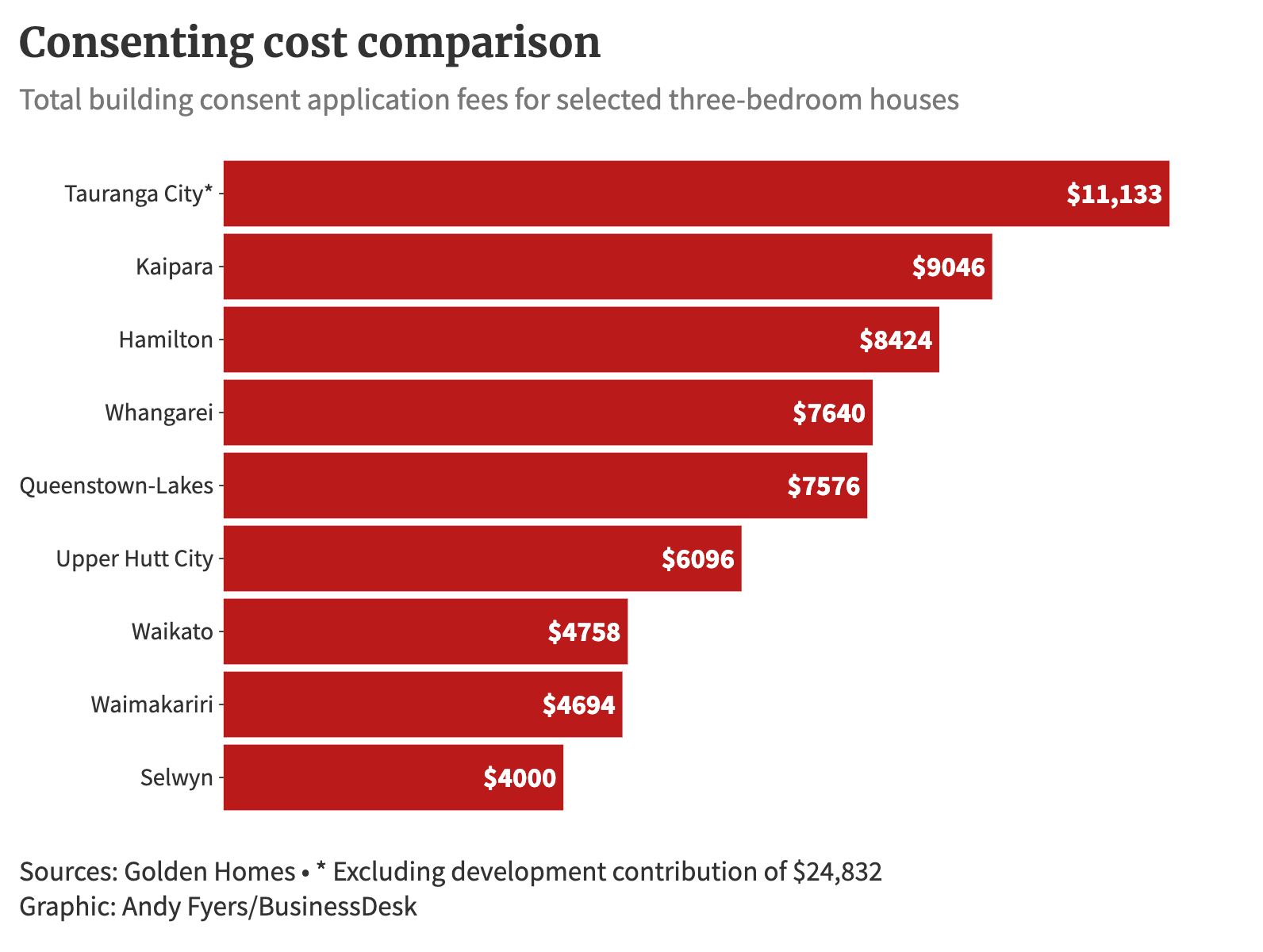
Craig Wearne, a Tauranga-based building consultant to Golden Homes, said the price variances came despite the franchise issuing its applications under CodeMark, a product-certification scheme set up to show building products and methods meet the NZ Building Code requirements.
Wearne said the building company wasn’t seeing any benefit to the certification because councils still go through their normal "tick the boxes" processes.
He said what used to be about five pages of floor, elevation and site plan 15 years ago, is now 51 pages “and we’re still building the exact same homes".
Relitigation
And despite handing the same suite of documents to every BCA, councils were “relitigating” the process as a knee-jerk reaction to the leaky homes fiasco of the 1990s and early 2000s.
“That’s on their assumption that modern, single-level brick-and-tile houses are going to fall down.”
Wearne said the inherent inefficiency of having so many decision-making entities was that a builder can’t take a house that fits on 400-square-metre site in Christchurch and put that same house next door in Selwyn without applying for resource consent.
Another major issue facing builders and developers was inconsistency in turning plans around. Wearne said some councils were able to provide consent within 48 hours, but others – like Auckland and South Waikato – were ranging between 35 and 40 days.
Auckland consented 21,463 homes for the 12 months to August 2022, an 8% increase on the year before, although August’s consent numbers were 13% down year-on-year.
'Manipulating' compliance
The Ministry of Business, Innovation and Employment (MBIE), meanwhile, has received 264 submissions, from BCAs, architects, engineers, industry bodies and product manufacturers, into its review of the building consent system.
In its issues discussion document, MBIE notes that most BCAs are achieving their statutory obligation of processing building consents within 20 days of receiving them, although performance “varied considerably” across authorities.
The report noted that decisions on consents were also being made within an average of 14 days.
However, Wearne said that that turnaround was being “manipulated” by territorial authorities.
“South Waikato has a pre-vetting process, which can take up to seven days. The clock only starts after that, and the builder will receive an email confirmation within about 15 days. Even then, the consent isn’t physically issued until after the application goes through the planning team. At that point, you might have to issue a consent amendment before formal approval."
Fragmented
Still, as far as MBIE is concerned, their turnaround time is “officially” 15 days, Wearne said.
Registered Master Builders chief executive David Kelly said a recent survey of its 3,000 members suggested that almost half of builders had experienced consenting delays of more than five weeks.
That, he said, could escalate prices by as much as 20% across an average build time of six to nine months.
Kelly said he’d like to see the “fragmented” number of territorial authorities condensed into a handful, including specialist consenting entities for commercial builds.
Social housing agency Kāinga Ora has already gone down that route, with the formation of Consentium last March, the first non-territorial authority to be accredited to provide both inspection and consenting services.
Consentium completed more than 400 consents last year, but is expecting to ramp that up to as many as 4,000 consents annually.


